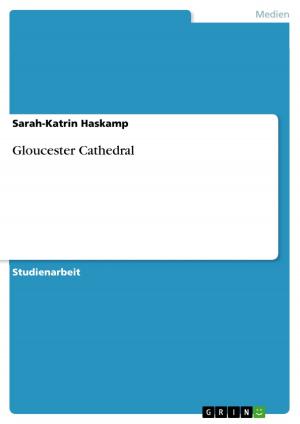| Author: | Matthias Schmid | ISBN: | 9783638741385 |
| Publisher: | GRIN Verlag | Publication: | May 8, 2007 |
| Imprint: | GRIN Verlag | Language: | English |
| Author: | Matthias Schmid |
| ISBN: | 9783638741385 |
| Publisher: | GRIN Verlag |
| Publication: | May 8, 2007 |
| Imprint: | GRIN Verlag |
| Language: | English |
Seminar paper from the year 2005 in the subject English Language and Literature Studies - Literature, grade: 1,3, Friedrich-Alexander University Erlangen-Nuremberg, 8 entries in the bibliography, language: English, abstract: Goethe's novel Wilhelm Meisters Lehrjahre, where this quotation is taken from, is unanimously regarded as the prototype of the Bildungsroman by literary scholars. In the following paper I am going to concentrate on the English Bildungsroman exclusively by analysing Charles Dickens's Great Expectations, a representative novel of the Victorian Bildungsroman. A Bildungsroman in general describes the life of the protagonist 'as a process of movement and adjustment from childhood to early maturity' and 'as a growing up and gradual self-discovery in the school-without-walls that is experience.' The plot of a typical English Bildungsroman can usually be divided into three stages in the hero's development: childhood, youth and maturity. During his first stage of development the protagonist, often an orphaned child, grows up contentedly in the country or in a provincial town. The experience of his first schooling, however, makes him unsatisfied with his lot. Driven by deficiencies and lack of options he sets out to seek his fortune in a cosmopolitan city which in almost all cases is London. This applies to the Victorian age in particular, when the British Empire was at the height of its political and colonial power with its centre in London. The journey from rural environment to the city initiates the second stage, where the hero's real education begins. He often is increasingly alienated from his childhood friends and persons of trust and experiences urban life. There he is involved in exalting and debasing love affairs. An additional typical theme of the Victorian Bildungsroman is the making of a gentleman. Only by reappraising his values can he enter upon his final stage of maturity. He then returns home to his place of origin to demonstrate the degree of his success or failure. There are numerous facets to this general description of the hero's life. A thorough analysis of Great Expectations will reveal the most important and most striking aspects of the genre. I am not going to make this distinction, because in the context of English literature these categories are far less rigid. Deriving its roots from Germany the Bildungsroman first came into being in England during the Age of Enlightenment. The victorious hero of the English Bildungsroman of the 18th century generally experienced a life '(...) of success, of obstacles overcome, of safety and prosperity reached.'
Seminar paper from the year 2005 in the subject English Language and Literature Studies - Literature, grade: 1,3, Friedrich-Alexander University Erlangen-Nuremberg, 8 entries in the bibliography, language: English, abstract: Goethe's novel Wilhelm Meisters Lehrjahre, where this quotation is taken from, is unanimously regarded as the prototype of the Bildungsroman by literary scholars. In the following paper I am going to concentrate on the English Bildungsroman exclusively by analysing Charles Dickens's Great Expectations, a representative novel of the Victorian Bildungsroman. A Bildungsroman in general describes the life of the protagonist 'as a process of movement and adjustment from childhood to early maturity' and 'as a growing up and gradual self-discovery in the school-without-walls that is experience.' The plot of a typical English Bildungsroman can usually be divided into three stages in the hero's development: childhood, youth and maturity. During his first stage of development the protagonist, often an orphaned child, grows up contentedly in the country or in a provincial town. The experience of his first schooling, however, makes him unsatisfied with his lot. Driven by deficiencies and lack of options he sets out to seek his fortune in a cosmopolitan city which in almost all cases is London. This applies to the Victorian age in particular, when the British Empire was at the height of its political and colonial power with its centre in London. The journey from rural environment to the city initiates the second stage, where the hero's real education begins. He often is increasingly alienated from his childhood friends and persons of trust and experiences urban life. There he is involved in exalting and debasing love affairs. An additional typical theme of the Victorian Bildungsroman is the making of a gentleman. Only by reappraising his values can he enter upon his final stage of maturity. He then returns home to his place of origin to demonstrate the degree of his success or failure. There are numerous facets to this general description of the hero's life. A thorough analysis of Great Expectations will reveal the most important and most striking aspects of the genre. I am not going to make this distinction, because in the context of English literature these categories are far less rigid. Deriving its roots from Germany the Bildungsroman first came into being in England during the Age of Enlightenment. The victorious hero of the English Bildungsroman of the 18th century generally experienced a life '(...) of success, of obstacles overcome, of safety and prosperity reached.'















